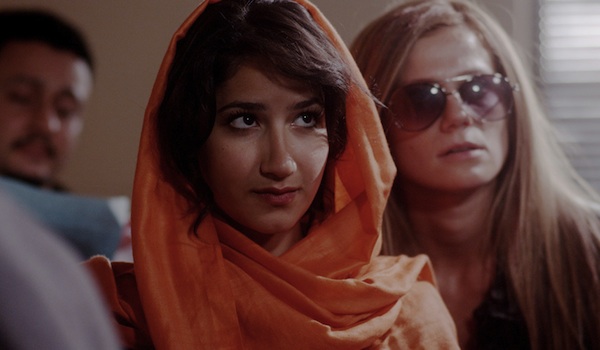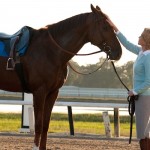Farah Goes Bang Review
Though it hits some annoyingly familiar notes within the road trip and “losing your virginity” subgenres, Farah Goes Bang bucks disappointment thanks to its unique, almost unshakable sense of disappointment. The film, about three recent college graduates (including one frustrated virgin) on the campaign trail for John Kerry in 2004, keeps building, building, building toward this incredibly adverse outcome. And while this isn’t a slice of Tarantino-style revisionist history, writer/director Meera Menon ultimately manages to subvert our expectations in satisfying (and funny) ways.
The film’s titular character is also the aforementioned virgin. Farah (Nikohl Boosheri) is protective of her body, but also quite embarrassed that “it” hasn’t happened yet. Her two best friends, KJ (Kandis Erickson) and Roopa (Kiran Deol), with whom she’s about to embark on a cross-country, John-Kerry-campaign-filled road trip, are relentless about it.
They, of course, have their own problems, which bubble up repeatedly over the course of the drive from California to Kerry’s Ohio headquarters. Roopa is controlling, while KJ has suffered a great personal loss recently. During stops in Arizona and Texas, they cross paths with some real meat-eating, freedom-loving, Bush-friendly Republicans. And by Ohio, they’re problems and lack of campaigning success threatens to drive them apart. But there’s a light at the end of the tunnel—they’re convinced a new president will be elected in a few short weeks. Their hard work will have paid off, and maybe before it’s done Farah can also pop her cherry.
The film starts out slowly. Menon and co-writer Laura Goode try a little to hard to be funny. Their early caricatures of Bush voters feel half-assed. There’s a devout Christian who sings about Bush, a racist cowboy who insults Farah (she’s Persian), and a very naive housewife. Ultimately, however, such characterizations work because later interactions (one with a drag queen, another with an older veteran) are heartfelt and essential in developing Farah’s character.
The story of KJ, too, develops at a consistent and appropriate pace. When the film kicks off, she seems fine. But after a few violent encounters with antagonistic individuals, she’s arrested. Why she becomes violent so easily is for you to discover. It explains a lot, and the revelation scene itself is a terrific showcase for Kandis Erickson.
The film’s tone is also something noteworthy. As Farah Goes Bang builds toward Election Day, the audience becomes more aware of what’s going on in this world than the characters are. Their hopes and dreams, by and large, are about to be shattered. There are hints that they don’t even care much about Kerry himself (not unlike some conservatives felt about Mitty Romney during the most recent presidential election), but the inevitable re-election of George W. Bush means these girls are about to be crushed. That they aren’t in the film’s denoument speaks volumes toward the idea that the journey, not the destination, is what truly matters.
There’s one pretty big misfire of a scene—the big “climax.” It’s tonally off and filled with obvious and overbearing symbolism. Excepting that, Farah Goes Bang is a nifty little film—funny, sweet, and surprisingly unique.
















